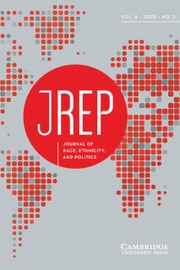Article contents
Race, Gender, and the Politics of Incivility: How Identity Moderates Perceptions of Uncivil Discourse
Published online by Cambridge University Press: 10 May 2022
Abstract
Many worry that uncivil discourse can undermine democratic processes. Yet, what exactly does it mean for discourse to be uncivil? I argue that there is systematic variation in perceptions of incivility based on the identity of those targeted by uncivil speech. Specifically, I show—via a conjoint survey experiment—that White Americans are less likely to view statements directed at Black Americans as uncivil but more likely to perceive incivility when the target is a woman or a co-partisan. These results suggest an identity-laden aspect of incivility such that it is acceptable to treat Black Americans with less civility but less acceptable to do so for women and co-partisans. The results have implications for how we assess discourse and how that discourse affects the public.
- Type
- Research Article
- Information
- Copyright
- © The Author(s), 2022. Published by Cambridge University Press on behalf of The Race, Ethnicity, and Politics Section of the American Political Science Association
References
A correction has been issued for this article:
- 7
- Cited by
Linked content
Please note a has been issued for this article.


